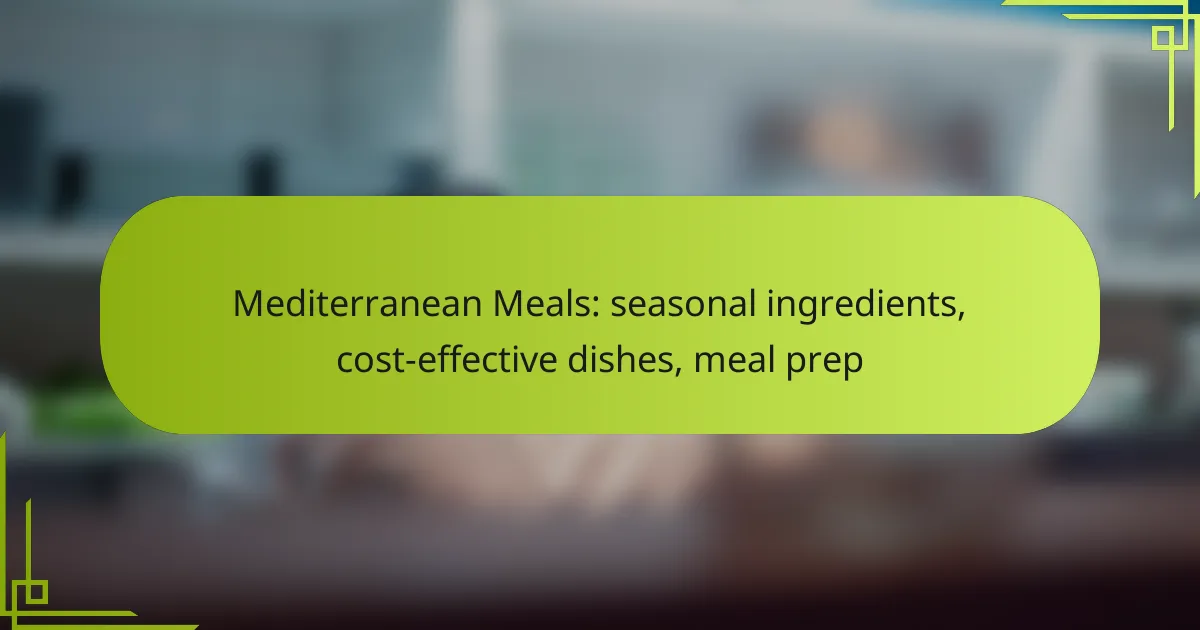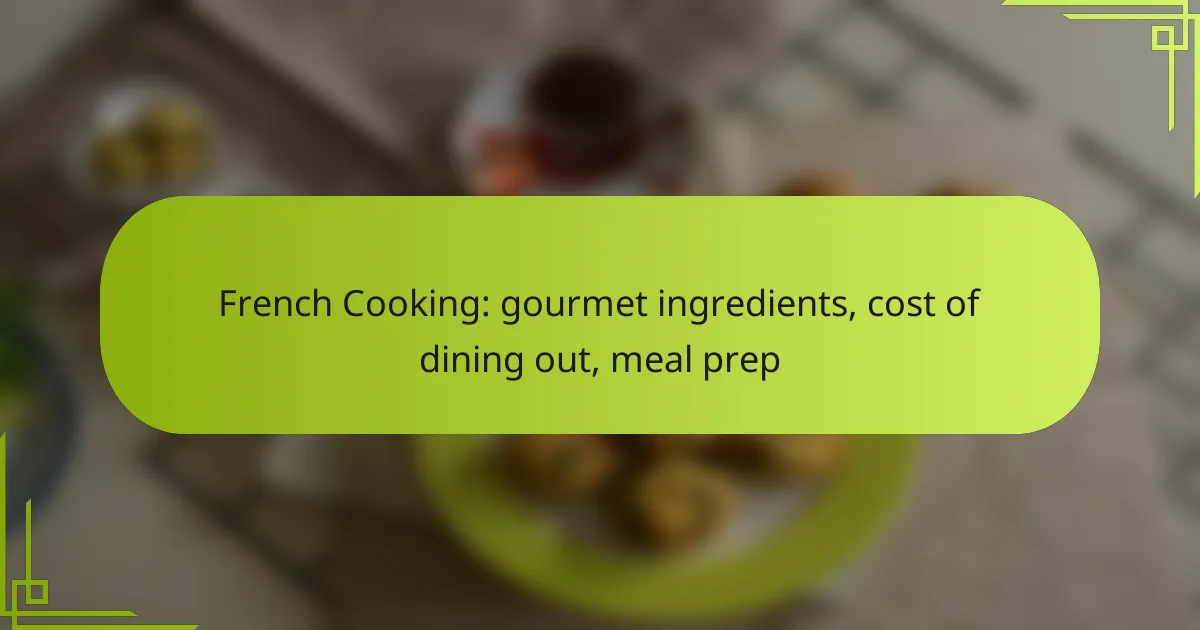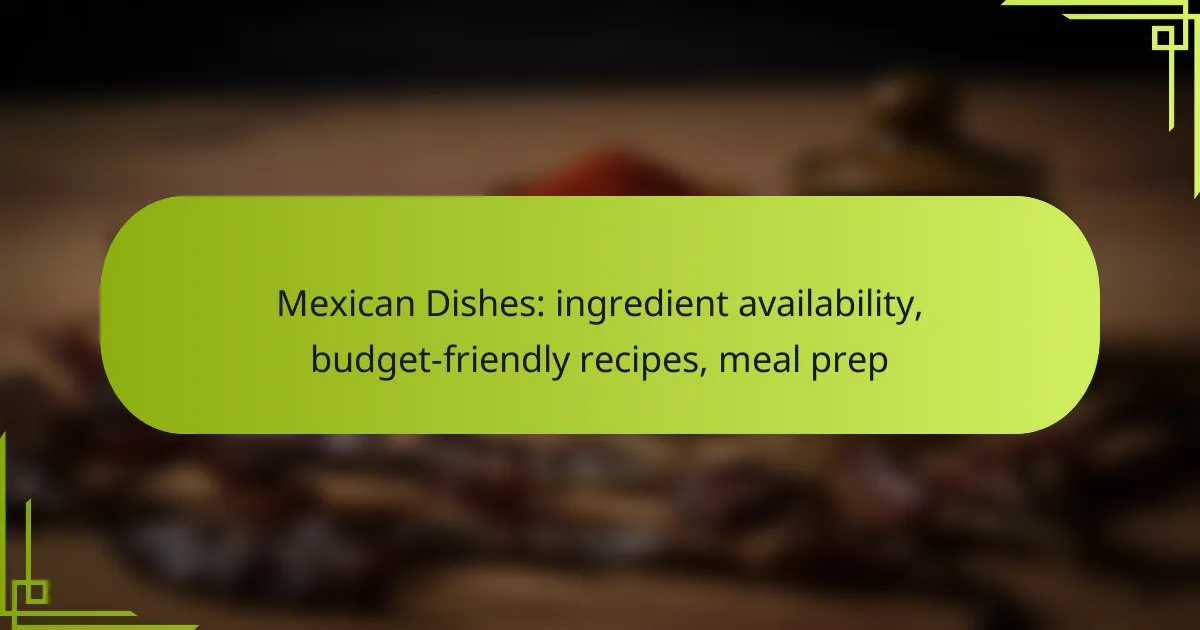Embracing Mediterranean meals allows you to enjoy vibrant flavors while utilizing seasonal ingredients available in the UK. By prioritizing fresh produce, you can craft nutritious and cost-effective dishes that delight the palate. Meal prep strategies, such as batch cooking and storing sauces, can further enhance your culinary experience, making it easier to enjoy healthy meals throughout the week.

What are the best Mediterranean meals for seasonal ingredients in the UK?
The best Mediterranean meals for seasonal ingredients in the UK highlight fresh produce available throughout the year. By focusing on seasonal vegetables and fruits, you can create delicious, cost-effective dishes that are both nutritious and flavorful.
Spring vegetable risotto
Spring vegetable risotto is a creamy dish that celebrates the vibrant flavors of seasonal spring produce. Ingredients like asparagus, peas, and broad beans are commonly used, providing a fresh taste that embodies the season.
To prepare this dish, start by sautéing onions and garlic in olive oil, then add Arborio rice and gradually incorporate vegetable broth while stirring. Mix in your choice of spring vegetables towards the end of cooking for optimal texture and flavor.
Summer ratatouille
Summer ratatouille is a classic Mediterranean dish that showcases the bounty of summer vegetables such as zucchini, eggplant, and bell peppers. This dish is not only colorful but also packed with nutrients.
To make ratatouille, chop the vegetables into uniform pieces and sauté them in olive oil with herbs like thyme and basil. Allow the mixture to simmer until the vegetables are tender, creating a hearty and satisfying meal that can be served warm or cold.
Autumn pumpkin soup
Autumn pumpkin soup is a comforting dish that highlights the seasonal availability of pumpkins and squashes. This soup is rich, creamy, and perfect for chilly days.
Begin by roasting pumpkin chunks until tender, then blend them with vegetable broth, onions, and spices like nutmeg and cinnamon. This soup can be garnished with a drizzle of olive oil or a sprinkle of pumpkin seeds for added texture.
Winter citrus salad
Winter citrus salad is a refreshing option that utilizes seasonal citrus fruits like oranges, grapefruits, and lemons. This salad provides a bright contrast to heavier winter meals and is rich in vitamin C.
To prepare the salad, segment the citrus fruits and toss them with mixed greens, olives, and a light vinaigrette. Adding nuts or seeds can enhance the flavor and provide a satisfying crunch.

How to create cost-effective Mediterranean dishes?
Creating cost-effective Mediterranean dishes involves using affordable, seasonal ingredients and simple cooking techniques. Focus on staples like legumes, grains, and vegetables to keep costs low while enjoying flavorful meals.
Utilizing canned chickpeas
Canned chickpeas are a versatile and budget-friendly ingredient that can enhance many Mediterranean dishes. They are ready to use, saving time and effort in meal preparation.
Incorporate canned chickpeas into salads, stews, or as a protein source in wraps. A single can typically costs a few dollars and can serve multiple portions, making it an economical choice.
Making lentil stew
Lentil stew is a hearty and nutritious option that is easy to prepare and inexpensive. Lentils are rich in protein and fiber, making them a filling base for meals.
To make a simple lentil stew, sauté onions, garlic, and carrots, then add lentils, broth, and spices. This dish can be made for under $10 and can feed a family for several days, especially when paired with rice or bread.
Preparing vegetable paella
Vegetable paella is a colorful and satisfying dish that can be made with seasonal vegetables. This rice-based meal is not only cost-effective but also allows for flexibility in ingredient choices based on what is available.
Start with a base of saffron-infused rice and add a variety of vegetables like bell peppers, peas, and artichokes. A large paella can be prepared for around $15, serving several people and providing a vibrant centerpiece for any meal.
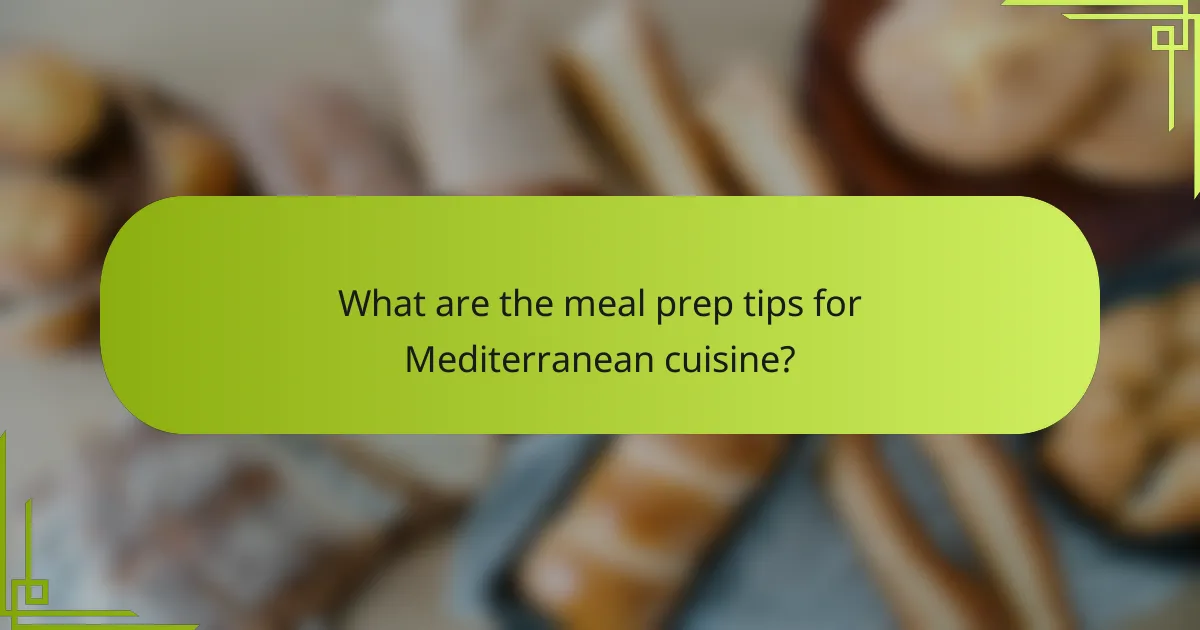
What are the meal prep tips for Mediterranean cuisine?
Meal prep for Mediterranean cuisine involves planning and preparing ingredients in advance to create healthy, flavorful dishes efficiently. Focus on batch cooking grains and storing sauces and dips to save time and reduce food waste.
Batch cooking grains
Batch cooking grains like quinoa, bulgur, or brown rice is a practical way to streamline meal prep. Cook a large quantity at once, then portion and store them in the refrigerator for up to a week or freeze for longer storage. This approach allows you to quickly assemble meals throughout the week.
Consider using a rice cooker or pressure cooker to simplify the process. For added flavor, cook grains in vegetable broth or add herbs during cooking. Aim for a variety of grains to keep meals interesting and nutritious.
Storing sauces and dips
Storing sauces and dips in advance can enhance your Mediterranean meals. Prepare staples like tzatziki, hummus, or pesto in larger batches and keep them in airtight containers in the fridge. Most sauces can last for about a week, while some, like pesto, can be frozen for several months.
Use small jars or ice cube trays for easy portioning. Label containers with the date and contents to avoid confusion. This practice not only saves time but also allows you to add flavor to various dishes quickly.
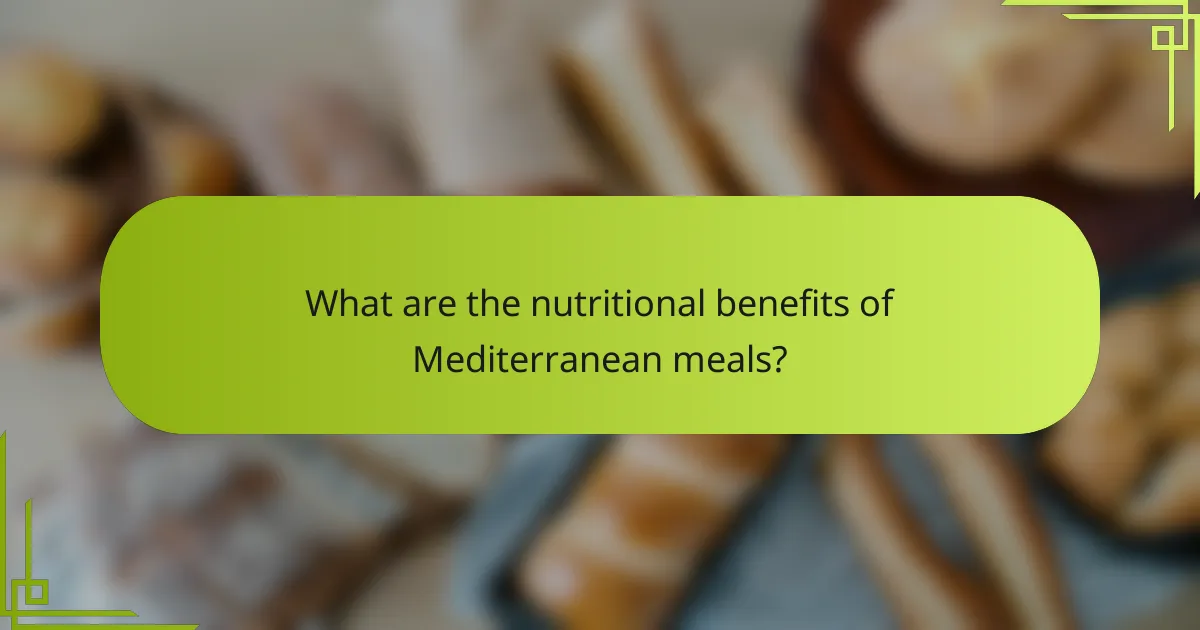
What are the nutritional benefits of Mediterranean meals?
Mediterranean meals offer numerous nutritional benefits, primarily due to their emphasis on whole foods and healthy ingredients. These meals are known for promoting heart health, reducing inflammation, and providing essential nutrients through a balanced diet rich in fruits, vegetables, whole grains, and healthy fats.
High in healthy fats
Mediterranean meals are characterized by their high content of healthy fats, particularly from sources like olive oil, nuts, and fatty fish. These fats are primarily monounsaturated and polyunsaturated, which can help lower bad cholesterol levels and reduce the risk of heart disease.
Incorporating healthy fats into your diet can be simple. For instance, using olive oil as a dressing or cooking fat, snacking on a handful of nuts, or including fish like salmon or sardines in your meals can significantly boost your intake of these beneficial fats.
Rich in antioxidants
The Mediterranean diet is abundant in antioxidants, which help combat oxidative stress and inflammation in the body. Foods such as fruits, vegetables, legumes, and whole grains are packed with vitamins and minerals that act as powerful antioxidants.
To maximize antioxidant intake, focus on colorful fruits and vegetables, such as berries, tomatoes, and leafy greens. Including a variety of these foods in your meals not only enhances flavor but also provides a wide range of health benefits, supporting overall wellness and longevity.
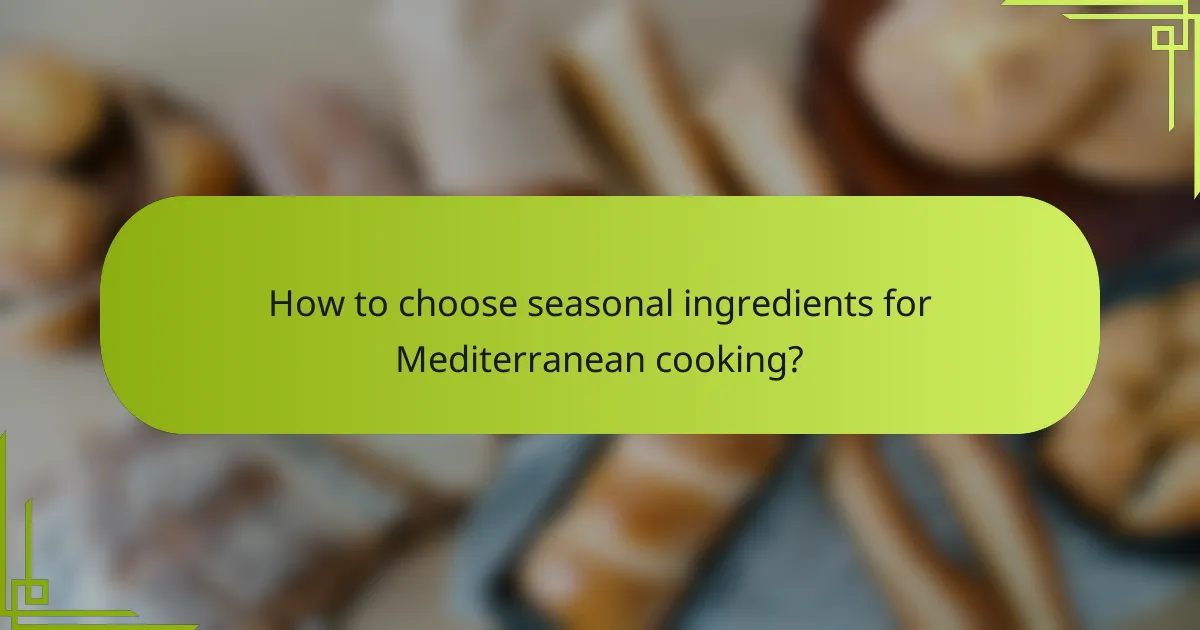
How to choose seasonal ingredients for Mediterranean cooking?
Choosing seasonal ingredients for Mediterranean cooking enhances flavor and freshness while supporting local agriculture. Focus on what is in season in your region, as this not only improves taste but can also reduce costs.
Local farmers’ markets
Local farmers’ markets are excellent sources for seasonal ingredients, offering fresh produce directly from growers. Shopping at these markets allows you to ask farmers about their harvests, ensuring you select the ripest and most flavorful items available.
Visiting farmers’ markets can also be cost-effective, as prices are often lower than in grocery stores. Look for deals on bulk purchases or seasonal specials to maximize your savings.
Seasonal produce guides
Seasonal produce guides provide valuable information on what fruits and vegetables are at their peak during different times of the year. These guides can help you plan meals around ingredients that are not only fresh but also affordable.
For example, in the summer months, tomatoes, zucchini, and peppers are typically abundant, while winter may bring root vegetables like carrots and potatoes. Utilize these guides to create menus that highlight the best seasonal flavors.

What are the best Mediterranean herbs and spices?
The best Mediterranean herbs and spices include oregano and basil, both essential for enhancing the flavors of various dishes. These ingredients not only add depth to meals but also offer health benefits, making them staples in Mediterranean cuisine.
Oregano
Oregano is a robust herb commonly used in Mediterranean cooking, known for its strong, aromatic flavor. It pairs well with tomatoes, meats, and grilled vegetables, making it a versatile addition to many dishes.
When using oregano, consider whether to use fresh or dried. Fresh oregano has a milder taste, while dried oregano is more concentrated. A general guideline is to use about one-third the amount of dried oregano compared to fresh.
Basil
Basil is another key herb in Mediterranean cuisine, celebrated for its sweet and slightly peppery flavor. It is often used in sauces, salads, and as a garnish, particularly in Italian dishes like pesto and Caprese salad.
For optimal flavor, add fresh basil towards the end of cooking or use it raw. If using dried basil, remember that its flavor is less intense, so you may need to adjust quantities accordingly. Fresh basil is typically preferred for its vibrant taste and aroma.






